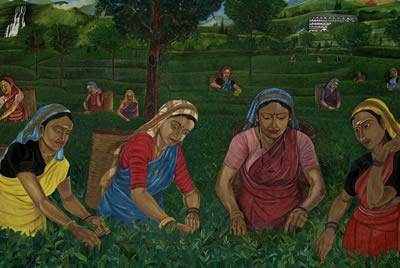 |
|
|
|
|
|
|
|
|
|
|
|
|
|
|
|
|
|
|
|
|
|
|
 |
 |
|
|
|
|
|
|
|
|
|
|
|
|

Sri Lankan White Tea
Once upon a time, long, long ago in deepest China a mighty Emperor, resplendent in the most glorious of silks, waited upon by countless minions, sat, on his magnificent throne sipping delicate tea from a dainty porcelain cup. This was a very special tea – untouched by human hands. Legend says that only unsullied Virgins using gold scissors, could snip the buds, then, serenely place the precious leaves in golden bowls. The leaves, with the help of the divine wind, were dried naturally until ready to store. It was a drink exclusively reserved for the royal court and was, even then, considered particularly beneficial to health. A truly celestial tea – befitting the god like Emperor. Over the centuries, the 'White Tea' lost its regal importance and consequently its popularity in China. Although now, thanks to impressive natural properties (an antioxidant level of 10.11%) the pale tea is making a comeback in today's modern health conscious society. The story continues to unfold, when, one day, not so very long ago a certain Mr. Herman Gunaratne, a renowned planter from Sri Lanka recognised the efficacy of this tea. Through a chance encounter with Royal personages from the Arabian Peninsula,( who had the tea scientifically analysed to authenticate its therapeutic power), he started in earnest to cultivate this curative tea. His lowland Sri Lankan plantation now produces some of the finest Virgin White Tea in the world. The White Tea bush is unremarkable. The only difference, at a quick glance, is that it's darker in color than its close relatives: nothing in fact really makes it stand out in a plantation of mixed tea bushes. However, the real difference comes when you consider the average tea-plucker on a standard tea plantation, could collect in the region of 30kg on a good day. A Virgin White Tea worker, wearing natural rubber gloves, snipping with a pair of tiny scissors, drops her leaves into a ceramic bowl at the rate 150g per plucking on a good day. On the plus side one teaspoon of this extraordinary tea can make at least three to four cups! Gunaratne still follows the tradition of making his Virgin White Tea on his estate, with each process following in its Royal heritage of 'untouched by hand'. While drying under a fan the leaves are agitated and turned by a stick until the required moisture content is satisfied by the master tea makers' tutored eye. If needed, if humidity is high, it might go into a dryer for a few minutes.
The Handunugoda Estate at Ahangama in the south of Sri Lanka, is open to visitors, who are treated to a complimentary luscious slice of chocolate cake and a pot of tea on the veranda of Gunaratne's own bungalow. A free guided tour around the tea factory is offered to learn about the intricacies of the making of the 'morning cuppa'and followed by a tasting session and a chance to buy some of the teas. There are Innumerable teas to be sipped, swirled and allowed to seduce the senses. The newest addition to the teas produced is named after the plantation owner's bestselling book 'The Suicide Club' - without giving the story away - you can taste the whisky and smell the oversized cigars as you shut your eyes and transport yourself back a few generations to a totally different way of life! As an aside, I was surprised when he told me that over 60% (roughly 370 million kilos per annum) of all Sri Lankan tea cultivation was grown below 2000'. Indeed, Herman's estate is only 100' above sea level and on a breezy day, with a strong on shore wind, the salt can almost be smelt in the air. Nevertheless, I found this fact hard to believe as having driven, seemingly for hours, through endless swathes of emerald green Hill countryside, with tea bushes covering every inch of the landscape far as the eye can see. The bushes, march, in serried ranks up and down the precipitous slopes; a study in greens – only broken– by a riot of colour when the gaily clad pluckers are at work in their multihued saris. Herman told me a delightful story from the French perfume capital – Grasse – where an acquaintance of his said he could tell, by the subtle difference in smell, which regions the various bunches of identical flowers came from. Simplistically speaking, each area would cook in a slightly different way ( i.e. maybe heavy in olive or sunflower oil cooking) – thus the skin would exude a slightly different aroma – and, when picking the flowers by hand would 'taint' the purity of the flowers scent. The ancient Chinese discovered this aeons ago and ensured their all mighty Emperor's Virgin White Tea was never contaminated by the likes of human bodily secretion – no matter how natural. They also used solid gold scissors and containers- quite perfect - as it does not corrode or taint the leaves. I wonder what our magnificent Chinese Emperor would have thought of the quality of Herman's Virgin White Tea? Well, if we managed to get past the Imperial flunkies and into his august presence, then I suspect he would have been delighted that his favourite drink was still in favour – but only if drunk by the rulers - and I'm sure he would have frowned at the cost cutting use of ceramics instead of his solid gold bowls and – heaven forbid – rubber gloves! Handunugoda Estate To get there: -- Deborah Radcliffe Fall 2011 |
||||||

